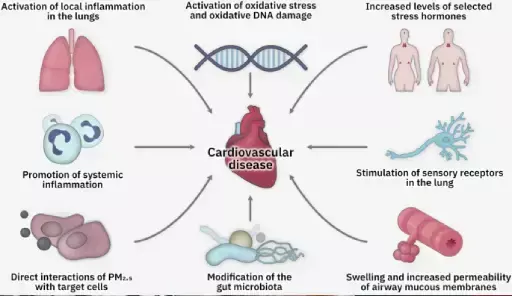Live
- Body delivered in parcel to woman in Andhra Pradesh
- Study shows surge in fake news, deepfakes in India; govt developing tools
- Mufasa Review: A Visual Spectacle But an Emotional Drought
- Reliance Jio Launches Rs. 999 Plan with Unlimited Calls and 196 GB Data
- 2025 Champions Trophy to Follow Hybrid Model with Matches in Pakistan and India
- Lagarcharla Farmers Deny Involvement in Collector Attack Case, Claim Unjust Arrest
- CM Sarma to launch key development projects in Assam's Nagaon district
- NTR 100-Foot Statue Approved by Telangana CM Near Outer Ring Road in Hyderabad
- YouTube’s New Anti-Clickbait Rules in India: What Creators Need to Know
- Clear pending cosmetic, mess charges, AISF demands
Just In
Six Useful Strategies to Control Your Heart During the Pollution Season


Six Useful Strategies to Control Your Heart During the Pollution Season
Protect your heart during pollution season with these tips: monitor blood pressure, stay hydrated, track air quality, and follow a heart-healthy diet.
The winter months bring with them higher concentrations of harmful pollutants because air pollution is still a serious health concern in India, particularly in big cities like Delhi, Mumbai, and Kolkata. The pollution risk is at its highest during these months and has a substantial effect on heart health. Given that the World Health Organisation estimates that air pollution causes more than 4.2 million avoidable deaths globally each year, heart patients are especially vulnerable.
Medical experts have recommended strategies to monitor and protect your heart health during this period of elevated risk due to the effect of air pollution on the cardiovascular system. The six heart health tips listed below are essential for safeguarding your cardiovascular health:
1. Check your blood pressure frequently.
Air pollution can cause blood pressure to increase, which further strains the heart. Regular blood pressure checks are crucial for early detection, especially during smog season. Taking your blood pressure at the same time each day is the simplest technique to ensure consistency. Elevated blood pressure may increase the risk of heart problems, particularly when pollution levels are high.
2. Drink Plenty of Water to Protect Your Heart
Dehydration thickens the blood, making it more difficult for the heart to pump blood efficiently. It's much more crucial to stay properly hydrated during pollution. Drink plenty of water throughout the day to maintain healthy blood flow. You can avoid unnecessary cardiovascular strain by recognising symptoms of dehydration, such as dark urine, dry mouth, or lightheadedness.
3. Pay attention to heart pressure
The effects of smog and cardiac issues may not be immediately apparent. Your heart may be under stress if you have palpitations, fatigue, chest pain, and shortness of breath. Pay careful attention to environmental factors such as the Air Quality Index (AQI) levels, and limit your outdoor activities when the air quality declines. Follow local air quality and health reports to limit your exposure to pollutants.
4. Make Plans for Regular Medical Exams and Heart Screenings
If you are at risk, the significance of cardiac screening grows. Regular ECG testing can identify early signs of cardiac strain caused by air pollution. A professional evaluation is always recommended, even though wearable equipment that measures ECG might make tracking at home easier. Making sure your heart is healthy and not under additional stress during months with high pollution levels is crucial.
5. Follow a Diet Good for Your Heart
Eating a well-balanced diet rich in antioxidants, fiber, and omega-3 fatty acids can help reduce the detrimental effects of air pollution on your heart. A lot of fruits, vegetables, seafood, and whole grains should be included in your meals. Anti-inflammatory foods such as leafy greens, almonds, and berries can help reduce the oxidative stress that pollution can cause, protecting your cardiovascular health.
6. Reduce Exposure and Monitor Local Air Quality
One of the best pollution avoidance tips is to be aware of the condition of the air. AQI readings should be closely monitored, especially when they increase to dangerously high levels (often above 100). Spending as much time indoors and minimizing outside exposure on days with high pollution levels will help reduce the cardiovascular strain that pollution produces.
Conclusion
Being proactive and alert is essential to safeguarding your heart health throughout the smog season. Eating a balanced diet, drinking lots of water, and monitoring your blood pressure are simple yet powerful strategies to reduce the detrimental effects of air pollution on heart health. By staying mindful of the pollution risk and following these heart-healthy guidelines, you can safeguard your heart during polluted months.
With the correct care and lifestyle modifications, this challenging season may be safely traversed. Pollution risk does not have to translate into heart health problems. Remember that maintaining a healthy lifestyle during smog means protecting your heart from environmental factors that could endanger your health in addition to avoiding pollution.

© 2024 Hyderabad Media House Limited/The Hans India. All rights reserved. Powered by hocalwire.com






